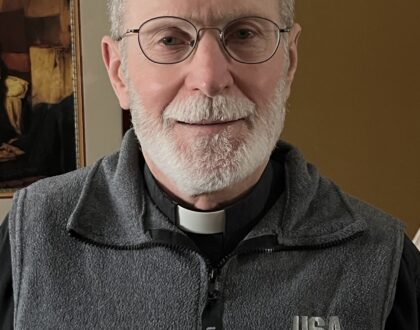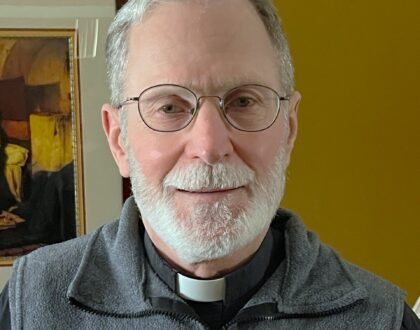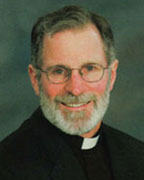Homily, March 3, 2024

From The Pastor
The Ten Commandments remain a foundation of the Christian life as well as all who seek an ordered life in God. The Commandments remain the ground upon which we stand even as we embrace the life of the Spirit in whom we live. Life in the Holy Spirit fully released in the death and Resurrection of Jesus is the fulfillment of the Ten Commandments in their meaning and purpose.
To begin, it is helpful to understand the context of when and why the commandments are given. God calls Moses to be the liberator of an oppressed and enslaved people. This extended period of slavery lasted for four hundred years. The people lost their personal and collective identity. With compassionate mercy God claims the people as his own. Freed from slavery, the Israelites had to be formed into God’s people. As such, the commandments were intended to form the people in the image of God and the nature of the Divine identity. This is much different than a demand for religious moral obedience. The commandments gave the people an identity of dignity and value in Divine compassion and justice.
The first commandment is prefaced by an introduction. To begin the relationship, God reveals who He is. “I, the Lord, am your God who delivered you out of the land of Egypt, that place of slavery.” What do we learn? God cares deeply for his own and delivers the oppressed from slavery and sin. God is redemptive, giving to us what we cannot give or do for ourselves.
In the first commandment, God is One. “You shall not have other gods before me.” Do not carve idols for yourselves from any created thing, or make anyone or anything more important than I. Do not worship things of your own making. Notice that God says: “I, the Lord, your God, am a jealous God…” This means God is protective, lovingly possessive of the people he claims as his own. This is the zeal or wrath of God who passionately defends the people in His compassionate care.
Second, God is Holy. “You shall not take the name of the Lord your God in vain.” God deserves singular reverence and honor. We surrender to the Sovereignty of God in our dependance on God for all things. God is worthy of all reverence.
Third, “Remember to keep holy the Sabbath.” Six days are for work, the seventh day is for God. The meaning is two-fold. God is to be worshipped with reverence and gratitude reflected in putting work down. The sabbath is also for our sake to rest and maintain a rightly ordered life. We are not made for work alone. Our life is ordered to give glory to God in work and in rest.
These first three commandments define God and our rightful relationship with God. They are primary and foundational for a growing relationship of faith and trust in God that will mature into life in the Spirit of Jesus.
The last seven commandments direct us to the dignity and identity that is ours as God’s holy people. Claimed as God’s possession in just compassion we walk in righteousness with our Creator-Redeemer. Further, the last seven commandments are God’s gift (wisdom) for social order and stability of human society. Wounded in sin that leads to disordered living, we are blessed with a standard and boundary of moral behavior for the betterment of all.
We have little to brag about in this regard. In too many segments of society these commandments appear to hold little influence. All society suffers and the moral decline impacts the stability and advancement of our path to God through our relationship in Christ. Human connectedness and healthy relationships are diminished in fear and mistrust. Faith wavers as moral decline weakens trust is God’s saving presence leading to wavering religious participation. Holding reverence, faith, and trust in God falls to the ignorance of self-made personal identity of truth. The cycle of slavery to sin and the gift of redemption continues to turn.
Our hope lies in the truth of Christ. The new and final covenant establishes the promise of eternal redemption. The Cleansing of the Temple is the sign of a new and final path to God. Jesus becomes the fulfillment of covenant sacrifice. Temple Law and the commerce of unending animal sacrifice ends. Jesus himself becomes the new Temple and the Lamb of sacrifice. The sacrifice of bulls, goats, and lambs is impotent. Jesus, the Lamb of God, is the fulfillment of the new and eternal covenant liberating us from the slavery of sin and death.
The Ten Commandments are a gift, an early beginning on our path to God. With surrendered obedience, Jesus is the Lamb of God who is our eternal redemption. Obedience is surrendered love that serves the glory of God and our liberation from this earthly realm. Honor God. Keep the Commandments. Strive to live in the fullness of the Spirit. You are God’s holy people.
Father John Esper
Recent Sermons

Homily, April 6, 2025
April 05, 2025

Homily, March 30, 2025
March 27, 2025

Homily, March 23, 2025
March 20, 2025

